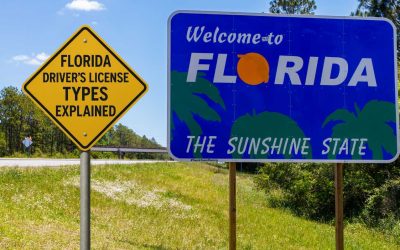Getting a driver’s license is a huge milestone for teenagers, but the rules are changing. Starting in 2025, Florida is rolling out new driving laws for teens, focusing on safety and more extensive training.
If you’re a parent, these changes mean a more structured process than you might remember from getting your own license. The goal is to better prepare new drivers and reduce risks on the road, where teens are more likely to be involved in accidents, especially during their first year.
Let’s walk through what’s different, what stays the same, and how your family can plan ahead.
Why the Changes Were Made
The state didn’t decide on new rules overnight. Research consistently shows that teenagers are more likely to underestimate hazards and overestimate their abilities. Late-night driving, speeding, and distracted driving are some of the top causes of accidents among this group.
Florida teen driving laws in 2025 focus on practice, supervision, and accountability rather than simply rushing teens to get their license. For families, this means more steps, but it also means more reassurance that new drivers aren’t left unprepared.
Updated Learner’s Permit Requirements
The biggest change comes at the very first stage of licensing. Before 2025, all first-time drivers in Florida took the four-hour Traffic Law and Substance Abuse Education (TLSAE) course. Starting August 1, 2025, that rule changed for anyone under 18.
Now, first-time drivers under 18 must complete a state-approved, six-hour driver education course before applying for their license. While this new requirement is formally referred to in the law, many course providers and teens know it by the industry acronym DETS, which stands for Driver Education Traffic Safety.
Here’s a quick breakdown:
| Course | Who Takes It | Length | Focus |
| DETS (Driver Education Traffic Safety) | Teens under 18 applying for a Florida license | 6 hours | Defensive driving, distracted driving, decision-making skills |
| TLSAE (Traffic Law & Substance Abuse Education) | Adults 18+ getting a license for the first time | 4 hours | Florida traffic laws, effects of drugs and alcohol |
A few details matter here:
- Teens who completed the TLSAE course before August 1, 2025 can still use their certificate to apply for a license, as long as it has not expired (certificates are valid for one year from the date of completion). If their certificate expires before they obtain their license, they will need to complete DETS instead.
- Teens completing TLSAE on or after August 1, 2025 will not be able to use it to apply for a license—they must complete DETS.
- Adults 18 and older applying for a license for the first time will continue to take TLSAE.
This update in Florida learner’s permit requirements signals a shift in priorities. DETS goes deeper than the basics, with lessons that reflect the realities of today’s roads.
Your Permit, Made Simple
No need to stress. ASI’s approved courses help you meet Florida’s requirements and pass your learner’s permit exam—all in one place, online.
Start Learning with ASIPractice Hours and Curfews
Once teens get their learner’s permit, the real training begins. Under the new Florida driving laws in 2025, they must hold that permit for 12 months (or until they turn 18, whichever comes first).
During that time, teens need to:
- Complete 50 supervised driving hours
- Include at least 10 hours at night
- Drive with a supervising adult who is 21 or older and seated in the front passenger seat
Parents often ask how to make these hours count. The key is variety:
- Try driving in different weather conditions, like rain
- Practice during heavier traffic, such as rush hour
- Include highway driving for higher-speed experience
Mixing up the practice sessions helps teens gain confidence and learn how to handle real-world challenges—things no textbook or manual can fully prepare them for.
Florida Teen Driving Curfew
Practice hours aren’t the only restriction. Curfews are another important part of Florida teen driving laws. In fact, the driving laws in Florida for 16 year olds specifically limit when they can be on the road.
- 16-year-olds may not drive between 11 p.m. and 6 a.m., unless accompanied by a licensed adult or traveling to or from work.
- 17-year-olds face a 1 a.m. to 5 a.m. restriction under the same conditions.
Why the curfews? Crash risks spike late at night, especially for new drivers with less experience handling fatigue, visibility challenges, or impaired drivers on the road. For parents, the curfew rules add reassurance that their teen won’t drive during the most dangerous hours unsupervised.
Speeding, DUIs, and Stricter Enforcement
Preparation is only one side of the equation. The other is accountability. Florida has stepped up enforcement for teens who break serious traffic laws.
So what does that actually look like on the road?
- Speeding can lead to steep fines, points on a record, and even suspensions for extreme violations.
- DUI offenses carry severe penalties, including license loss and long delays before a teen can apply for a full license.
These consequences reflect the state’s intent to make responsibility a core part of driving. Breaking the rules doesn’t just mean a ticket. It can set back the entire licensing process.
At the same time, Florida promotes prevention. Programs such as the Teen Driver Challenge, offered by many sheriff’s offices, let teens practice defensive driving in controlled environments. Some attend after a violation, while others enroll proactively. Either way, the experience gives them valuable real-world skills before they face challenges on their own.
Florida Driver Education Courses and Why They Matter
Courses like DETS and defensive driving classes play a key role in preparing teens for safe driving, especially with the new Florida driving laws taking effect in 2025.
Florida driver education courses aren’t just about memorizing rules. They emphasize real-world decision-making, anticipating hazards, and managing distractions—skills that research shows can lower crash risks. Parents who encourage their teens to complete these programs often notice the difference in confidence and awareness behind the wheel.
The American Safety Institute (ASI) is one of Florida’s approved providers for these courses. With online options available, ASI makes it easier for families to meet state requirements without unnecessary stress.
Moving Forward
The new Florida driving laws of 2025 change the path to a license more than Florida has seen in years. Longer permit stages, stricter rules, and new education requirements may feel like added steps, but they’re meant to protect young drivers when they’re most vulnerable.
For families, this is the moment to plan ahead. Make sure your teen completes the right course, builds real experience during practice hours, and understands the consequences of risky choices. Doing so not only keeps them on track—it also builds habits that last well beyond the licensing process.
Take the Next Step with ASI
Getting a license is a milestone every teen looks forward to, but the process can feel stressful without the right guidance. That’s where the American Safety Institute steps in. Our state-approved courses do more than check boxes—they give families peace of mind and teens the confidence to handle real-world driving. Whether it’s meeting the new DETS requirement or building smart habits through defensive driving, ASI makes sure every step toward the license feels clear, doable, and exciting.
Ready to Drive?
From your learner’s permit to your full license, ASI offers the courses you need to meet Florida’s requirements. Learn from a trusted, state-approved provider.
Start Driving Smart with ASI



